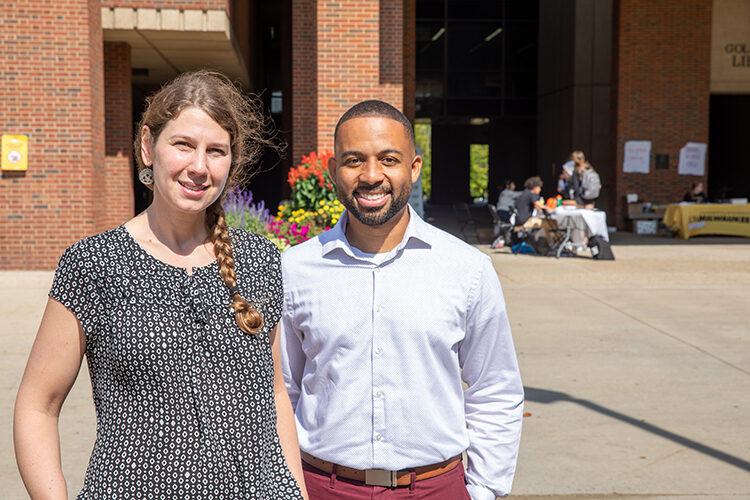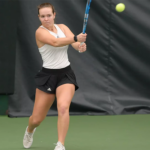In recent years, increased attention is being paid to incidents of hate speech at universities and on social media by university students, including at UWM. But hate speech is generally protected by the First Amendment of the U.S. Constitution, and public universities have long been committed to the free exchange of ideas that free speech brings, even if some of that speech or ideas is offensive.
In order to balance the right of free speech with the university’s commitment to provide compassionate care for our community, UWM launched a task force in 2019. The Care, Respect and Expression Task Force forged a set of recommendations to help support and communicate with the campus community when hate speech incidents occur, to help everyone understand the complexities of freedom of speech and expression, and to give students and others some resources for community building and dialogue.
The task force’s report was issued in March 2020, just as the pandemic began. Many of the recommendations have already been enacted.
UWM staff members who are now co-leading the Care, Respect and Expression Standing Committee are Kyla Esguerra, interim director of the Office of Undergraduate Research, and Michael Rogers, director of advocacy and engagement in the Division of Student Affairs. Here they talk about how far the effort has come and where it is going in its goal to help support students when they are impacted by hate speech.
Some members of campus might not be familiar with the Care, Respect and Expression initiative. Could you fill us in on what has been accomplished so far?
Esguerra: The initiative was already underway when Michael and I were asked to chair it a year ago. So, there’s been a start with some of the recommendations completed.
One of the goals met was launching the Free Speech, Rights and Responsibilities website that helps students understand what speech is constitutionally protected and where students can go to report a hate or bias-related incident. The website provides that, but it’s not just for reporting incidents. There’s also information about how students can demonstrate or organize an event, find support and others in the community, and learn more about how the university has responded to incidents.
There’s a university statement on free speech on the website. This statement was an effort to inform students about our obligations, rights and responsibilities under the First Amendment. Now that the site is live, our goal this year is to bring some awareness of it to students as well as support public conversations about difficult topics that are important to us as a caring community.
If an incident occurs now, what can students expect will happen?
Esguerra: If UWM becomes aware of the matter, our first goal is to care for those who are impacted, respond quickly, and provide as much information as we can to the campus.
That response will vary on the specifics of the incident, who is involved, and what our students need. If there is potential violation of university policies, and the speaker is a faculty or staff member, the Office of Equity/Diversity Services can investigate. The Dean of Students Office investigates potential student conduct policy violations.
If students are involved, our dean of students, Adam Jussel, has put together a team of campus partners that come together quickly in response to hate/bias incidents in the community from a non-disciplinary lens. Responses could include a campus-level communique, a departmental-level message or an event, like a talkback for students. This team will advise campus leadership on communications, programming, and help support students in need.
What kinds of feedback have students provided?
Rogers: There is a group of leaders of diverse student organizations that we meet with once a month. This is convened by the Student Association and was one of the outcomes after someone posted a video last year of a student making racist and homophobic comments before they were enrolled at UWM. Other students were pretty upset by the video and demanded that they be able to meet with administrators on a regular basis. In addition to the meetings, student leaders had the opportunity to meet with the chancellor in January of this year, which is something that will occur on a regular basis.
I would say the biggest thing that they’ve been telling us is that we have to stay in touch with students. So that’s what we really tried to do last year. Our connections have been primarily with the Student Association and leaders from other cultural organizations on campus, and we are trying to figure out how we keep that momentum moving forward in this new school year.
Esguerra: Early feedback from students indicated they wanted more timely and more compassionate responses from the administration when hate or bias incidents occur.
Are there any new ideas for how to connect with students on the speech topic? Who are you partnering with this year?
Rogers: This year, the Student Involvement Office and Inclusive Excellence Center are going to be partnering on an existing series called Courageous Conversations. These events are typically once a month and focus on different topics. To help us build an audience, we’d like to encourage faculty members to recommend them or assign their students to attend, consistent with course content.
There is definitely work happening in multiple corners of campus on this topic, such as the Division of Diversity, Equity and Inclusion, the Dean of Students Office, and Centers for Advocacy and Student Engagement in Student Affairs.
Tell us more about the public record of reported incidents.
Rogers: The purpose behind this blog on UWM’s website is for transparency with students, so they can find out about any incident on campus: what took place, what the details are, and all of the steps that were taken by the institution. Sometimes there will be confidential details that can’t be shared, but all the information that we can share will be included, and students can look at the progress.
Esguerra: If someone reports something using the form on the website, that also can trigger the Dean of Students team and outreach to students to try to ensure they are connected to resources and support while they are awaiting formal responses.
What are your priorities for the coming year?
Esguerra: One of our goals for this year is to provide professional development for additional faculty and staff in terms of facilitating difficult conversations both in general and at events that we’ll be hosting in the spring. More faculty and staff trained to participate will help continue to grow a campus climate of care, respect and expression.
Information about training for faculty and staff will be available in the next several months as the standing committee gears up for spring.






